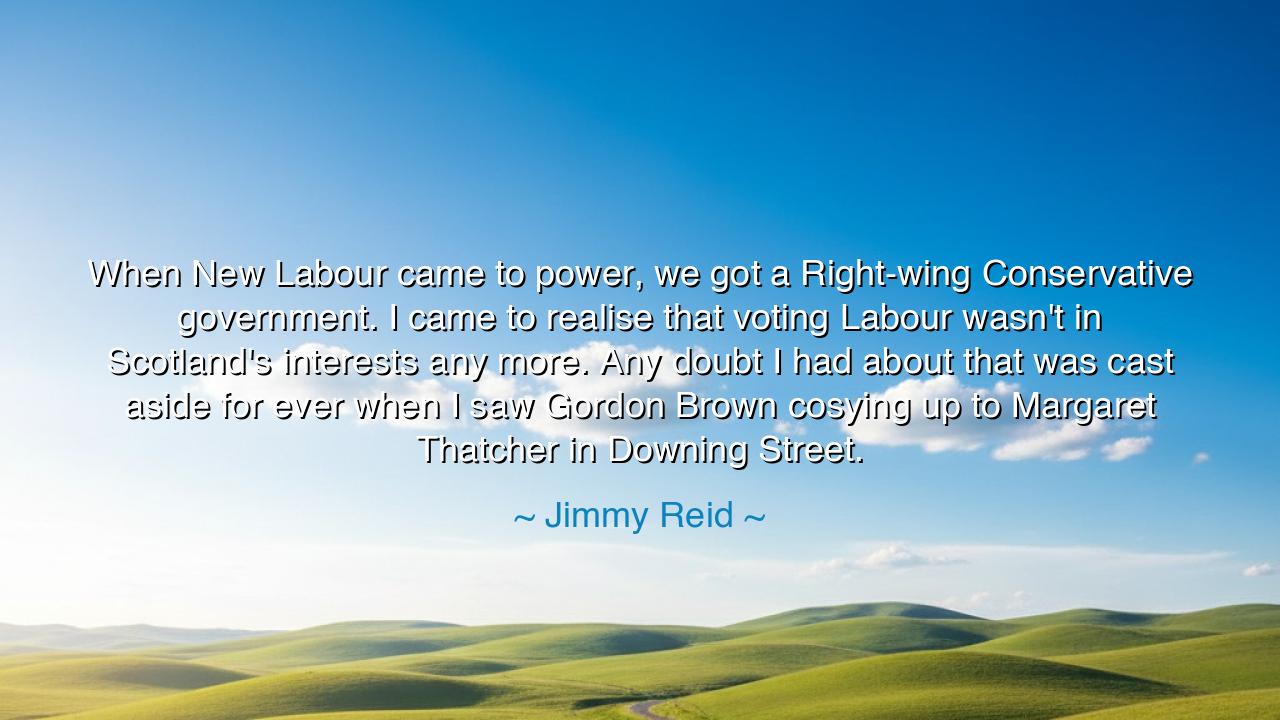
When New Labour came to power, we got a Right-wing Conservative
When New Labour came to power, we got a Right-wing Conservative government. I came to realise that voting Labour wasn't in Scotland's interests any more. Any doubt I had about that was cast aside for ever when I saw Gordon Brown cosying up to Margaret Thatcher in Downing Street.






"When New Labour came to power, we got a Right-wing Conservative government. I came to realise that voting Labour wasn't in Scotland's interests any more. Any doubt I had about that was cast aside for ever when I saw Gordon Brown cosying up to Margaret Thatcher in Downing Street." — Jimmy Reid
Hear now, O sons and daughters of the working land, the words of Jimmy Reid, a man forged in the furnaces of Scotland’s shipyards and tempered by struggle. His voice, though born in the clamor of labor and steel, carried the music of conscience and the fire of conviction. When he spoke these words, he was not merely lamenting a betrayal of politics — he was mourning the fading of principles. For when New Labour came to power, he said, the people were promised renewal, justice, and compassion; yet what emerged instead was but a reflection of the very Right-wing rule they had sought to replace. In that moment, Reid saw that the banner of progress had been traded for the cloak of power — and his faith in old loyalties was forever broken.
To understand his meaning, we must first know the man. Jimmy Reid was no ordinary politician; he was a worker, an orator, a reformer whose words could still the noise of a thousand voices. In 1971, when the shipyards of the River Clyde were threatened with closure, Reid led his people in a protest not of rage but of dignity — a “work-in,” where the men refused to riot or despair, but labored on to prove their worth. He became a symbol of the Scottish working class: proud, principled, and unafraid. He believed deeply in the ideals of Labour — in solidarity, equality, and the unyielding belief that government must serve the people, not the powerful. But when those ideals were abandoned by those who once preached them, his heart turned cold with clarity.
When New Labour rose under Tony Blair and Gordon Brown, it promised a gentler revolution — a “Third Way” between socialism and capitalism. Yet Reid saw in it the shadow of compromise that became capitulation. To him, it was no longer a party of workers, but a machine of ambition, dressed in the language of reform yet driven by the greed of the market. And when he witnessed Brown, a son of Scotland and a supposed champion of the poor, walking arm-in-arm with Margaret Thatcher — the very figure whose policies had torn the industrial heart out of Scotland — he saw not reconciliation, but betrayal. For Thatcher had been, in his eyes, the destroyer of communities, the cold architect of privatisation and inequality. To see her welcomed into Downing Street by those who claimed to oppose her was, for Reid, a wound to the very soul of the movement.
Reid’s words are not merely political; they are moral and prophetic. He warns of the danger that comes when movements built on conviction become enslaved to pragmatism — when the pursuit of power overshadows the pursuit of justice. “We got a Right-wing Conservative government,” he said, not because the Tories had won, but because their ideas had conquered even their enemies. This, he lamented, is how revolutions die — not by force, but by mimicry; not in battle, but in surrender. For when those who once spoke for the people begin to imitate those who oppressed them, hope itself is betrayed, and the language of progress becomes an echo of the past.
The history of nations is filled with such moments. In the Roman Republic, the leaders who once claimed to defend the plebeians grew wealthy and distant, adopting the manners of the patricians they had once resisted. In France, after the Revolution, the same ideals of liberty and equality gave birth to empire, as power devoured principle. And so too in modern times, the parties of the people often forget their roots once they taste the comfort of authority. Reid’s warning is universal: that any government, no matter how noble its origin, will lose its soul when it ceases to listen to the cries of the people it was born to serve.
But even in his disillusionment, Jimmy Reid’s words carry the ember of hope. For in recognizing betrayal, he reminds us that ideals still matter — that principles, once lost, can yet be reclaimed. The lesson is not to despair when leaders fail, but to remember that truth belongs to no party. It belongs to those who live it. When he turned away from Labour, he was not abandoning justice — he was defending it. His defiance was not bitterness, but fidelity: fidelity to the working man, to the dream of equality, to the unbroken belief that the people deserve better than imitation.
So, my friends, let this be your inheritance from the spirit of Jimmy Reid: never give your loyalty to names or colors, but to principles. Question those who promise progress yet dine with power. Hold fast to compassion, fairness, and dignity — even when the world calls such virtues naïve. For governments rise and fall, and parties change their garments, but the truth of justice endures like the tide. Reid saw what happens when conviction bows to convenience, and he chose instead to stand alone. Follow his example: be steadfast, be vigilant, and never let the flame of integrity be dimmed by the glitter of power. For though the halls of government may forget, the conscience of the people must never do so.






AAdministratorAdministrator
Welcome, honored guests. Please leave a comment, we will respond soon